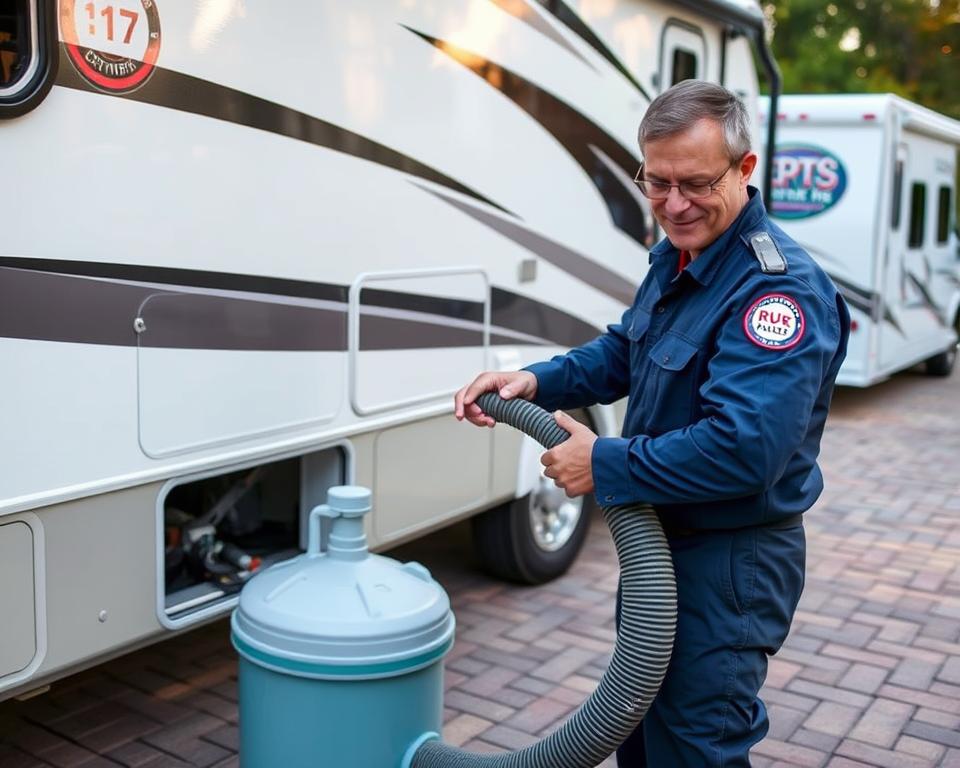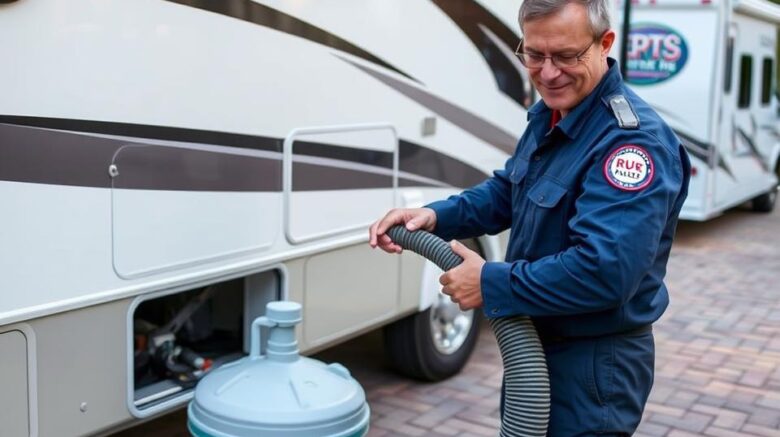RV Tank Emptying: Your Manual to Straightforward Disposal
Have you ever pondered about your RV’s waste management while enjoying the wilderness? Septic servicing matters greatly, often more than you think. It’s vital to have your motorhome’s waste system working well for smooth travel. This guide explains RV waste systems, the need for septic pumping, and top tips for stress-free excursions. With RV septic tank service services from All in Sanitation, you can focus on exploring, not emptying tanks.
Key Insights
- Knowing your RV’s waste system matters greatly for effective septic service.
- Routine tank emptying avoids unexpected issues on the road.
- Following tips prolongs your motorhome’s pipework lifespan.
- Rely on All in Sanitation for dependable RV waste solutions.
- Timing your pumping prevents headaches at campsites.
- Proper wastewater disposal is key to responsible RV ownership.
Understanding RV Waste Systems
On-the-go waste setups in RVs play a vital role in sanitation. These systems typically comprise black and gray water storage. The black tanks collect toilet waste. Gray water tanks manage dish and shower runoff. Knowing their operations improves waste management in your RV.
It’s critical to maintain these systems properly. Neglecting scheduled emptying can cause clogs. This could spoil your camping trips. Ensure regular checks to keep both tank types functioning well.
Using a dependable black water service is key for proper tank emptying. Also, treatments tailored for RV systems can prolong tank life and avert bad smells. Proper care of your waste system boosts your RV experience significantly.
The Importance of RV Tank Emptying
Routine septic service ensures a clean and efficient RV. Neglecting wastewater management leads to foul smells, blockages, and system breakdowns. Accumulated waste poses health risks from bacteria. Thus, ongoing upkeep is indispensable.
Using a professional service like All in Sanitation ensures eco-friendly waste disposal. They handle your sewage with care and precision. Regular septic system care prolongs your travel joys without waste concerns. It ensures your road trips remain enjoyable, avoiding the dangers of overlooked RV septic pumping.
Determining RV Pumping Frequency
How often you empty tanks influences your RV’s sanitation. It ensures your journey remains uninterrupted. Your pumping schedule depends on occupancy, tank capacity, and usage patterns.
If you camp sporadically, consider emptying black water tanks every few days. Full-time RV dwellers might need to pump more often due to more waste. Monitoring tank levels closely can improve your maintenance routine significantly.
Using tank treatments helps you gauge emptying times. By adhering to these disposal recommendations, RV owners can effectively safeguard their systems. Avoiding overflows preserves your RV’s plumbing and cleanliness.

Methods for RV Septic Pumping
Several effective methods exist for RV septic pumping, catering to different preferences. Maceration uses a pump to liquefy solids to transform waste into liquid sludge. It enables smooth transfers to dump points. Many choose it for its speed and simplicity.
Residential dumping routes your RV waste into your home septic. It’s essential to verify local regulations to avoid non-compliance with waste disposal laws. This method is both environmentally safe and directly manages RV waste when properly used.
Gravity dumping uses gravitational force to release waste into a cleanout port, being the most straightforward method. All dumping options have advantages and drawbacks. Knowing the differences helps you pick the right approach for clean and efficient disposal.
RV Septic Pumping Equipment and Tools
Effective RV septic pumping requires appropriate tools. A top-notch sewer hose is vital for connecting your RV’s waste tank to the dump station. It must be both durable and flexible for easy maneuvering. Quality hoses turn dumping into a quick task.
Include a macerator pump in your gear list. They convert solids into liquid for easier dumping. They’re particularly useful where gravity can’t aid the emptying process.
Keep your waste tools in top condition. Rinse equipment after every job to prevent buildup. Storing them neatly ensures they’re always ready for use. Taking care of your equipment guarantees hygiene and efficiency during disposal tasks.
Top Tips for RV Sewer Maintenance
A tidy waste setup makes camping more enjoyable. To ensure this, it’s important to adopt best practices for RV sewer cleaning. Start by always dumping black water first, then follow with gray water. This process uses the cleaner water to flush out the tanks, preventing clogs and buildup.
Choose enzyme or bacterial additives for superior breakdown. They maintain a balanced microbial ecosystem in your tanks. Avoid bleach or strong cleaners that harm your septic’s helpful microbes.
Consistently rinsing tanks, hoses, and connectors is key to avoiding odors and blockages. Use separate hoses for black water to reduce contamination risks. This habit enhances overall sanitation hygiene.
Follow this routine to streamline sewer cleaning:
- Empty black tanks before gray.
- Apply microbial additives routinely.
- Avoid harsh chemicals that harm bacteria.
- Rinse tanks, hoses, and connectors after every use.
- Check valves and seals to catch leaks early.
Following these steps, RV owners can improve the life span and functionality of their wastewater systems. Resulting in stress-free outdoor adventures.
Mobile Home Septic Maintenance
Similar to RVs, mobile homes need regular septic care for lasting performance. Timely maintenance helps avoid costly fixes and downtime. It is recommended to pump the tank every three to five years, depending on how much you use it and its size.
Effective disposal methods are key to maintaining your septic system. Only introduce safe, approved substances into the system. To reduce damage, use biodegradable products and keep an eye on tank levels. Harsh chemicals should be avoided as they harm the microbes that break down waste.
Scheduling regular professional inspections can catch potential problems early. Proactive inspections maintain seamless functionality. Following these guidelines keeps your home septic in peak shape.
Camper Waste Dumping Advice
Proper camper dump practices enhance travel comfort. Locate approved dumping spots before departure. Verify legal compliance to prevent penalties and eco-harm. Opting for RV-friendly products can enhance the tanks’ condition, facilitating efficient camper tank pumping.
Flushing with clean water helps clear tanks completely. A thorough rinse eliminates leftover sludge. This residue can cause odors and blockages. Plus, it aligns with green practices.
Advance planning is vital. Scheduling dump stops around your itinerary streamlines the process. This organization aids in streamlining the camper tank pumping process. Some useful tips for waste disposal include:
- Regularly monitor tank levels to decide when pumping is needed.
- Use bio-additives to accelerate breakdown and maintain tank health.
- Protect yourself with gloves and sanitization after handling equipment.
What You Need to Know About Holding Tank Treatments
Your RV’s sanitation system depends on effective tank treatments. Formulations contain targeted microbes and enzymes. Designed to decompose solids efficiently. Using them regularly stops bad odors and ensures tanks stay clear, boosting overall performance.
Adding bio-treatments fosters a healthy septic ecosystem. Speeding up breakdown reduces tank buildup. This means you’ll need to pump out waste less often, extending your septic system’s lifespan.
When selecting an RV holding tank treatment, consider your motorhome’s requirements. Treatment options range widely. Opt for green, home-compatible formulas. They ensure efficient waste processing and enhance your RV’s waste management system.
| Type of Treatment | Active Ingredients | Benefits |
|---|---|---|
| Liquid Formulas | Bio-catalysts | User-friendly; powerful decomposition |
| Powdered Solutions | Catalytic agents | Budget-friendly; durable |
| Tablet Treatments | Compressed bacteria | Convenient; pre-measured dosages |
Common Mistakes to Avoid During Pumping
Many RV owners make errors during septic pumping that complicate waste management. A frequent oversight is not adhering to a routine pumping schedule. This leads to a quickly filling tank and subsequent issues. Additionally, the incorrect use of chemicals can damage the septic system. This often results in expensive repairs due to the disruption of system operations.
Another common mistake is not following the correct order when dumping tanks. The sequence is crucial, especially for black water service. Reversing the order invites leaks and smells. It’s also vital not to open the septic tank access lids during home dumping. Leave complex dumping tasks to experts for safety.
Ignoring tool upkeep invites equipment failures. Routine gear care supports clean, effective dumping. Awareness of these potential errors can streamline waste management. And keeps campsites fresh and hygienic.
As a Final Point
An in-depth guide on RV septic pumping is vital for RV or mobile home owners. They pave the way for hassle-free travels. Regular maintenance and understanding your waste system can enhance your travels significantly. Employing correct methods and gear ensures stress-free camping.
Partnering with All in Sanitation brings peace of mind. Their professionalism guarantees that your wastewater management is in expert hands. Allowing you to focus on memories, not maintenance.
Routine tank emptying is fundamental to conscientious camping. It merges adventure with an odor-free, clean campsite. This balance ensures a pleasant experience for you and your companions on every journey.
